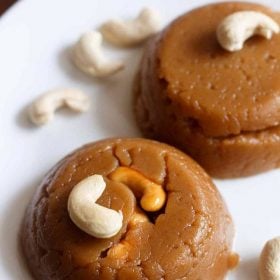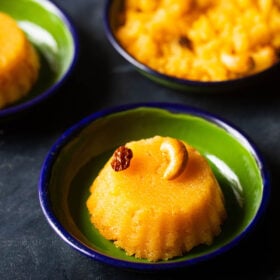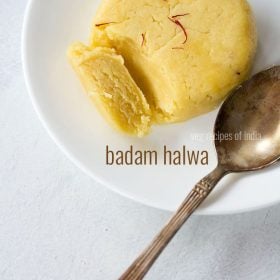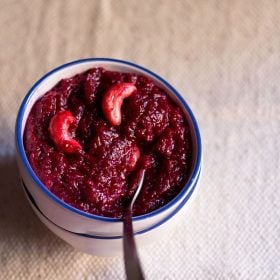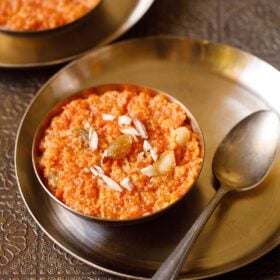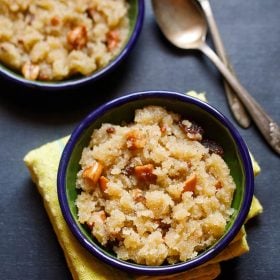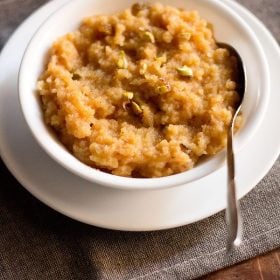Popular both in Rajasthan and other parts of North India, the Moong Dal Halwa is a rich and decadent Indian dessert made with moong lentils, ghee, milk, sugar, fragrant flavorings and nuts. The richness of this Moong Dal Halwa recipe makes it a perfect dish to keep the body warm during the extreme winters of Northern India. It is a bit heavy, but you really can’t miss trying on this special halwa preparation. I’ll also suggest that you run an extra mile after having it!
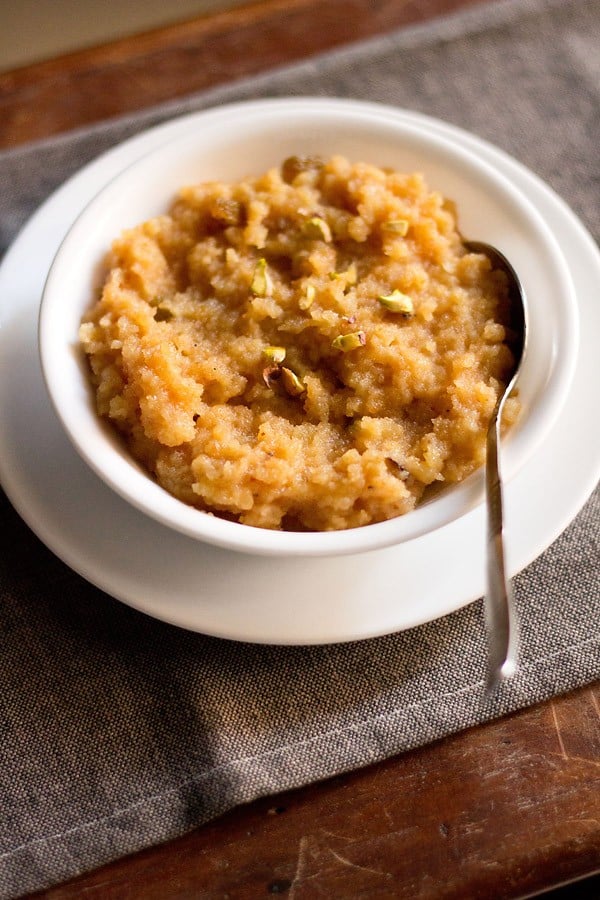
Table of Contents
About Moong Dal Halwa
The Moong Dal Halwa recipe might be a calorie laden one. But you really can’t say no to something that is so delicious, almost addictive I would say. You’ll know this once you take a bite of it. The heart will desire more and more of it.
The quantity of ghee that goes in an authentic recipe of Moong Dal Halwa will also give you some stress. But don’t worry about it, as that is what makes this dish the apt choice to help you deal with the nail biting, cold winters of North India. The tastiest sweet way to bring in some warmth during that time of the year!
Apart from being an essential preparation to combat the cold months, the Moong Dal Halwa recipe is also a must on the list of recipes kept for special occasions like weddings or festive celebrations like Holi and Diwali.
I feel it’s quite good to have this rich preparation on the ‘festival of colors,’ as all the running and playing with colors will help burn those excessive calories too!
More On The Recipe
I knew that this is especially one of those halwa which is quite time intensive and takes a good amount of patience and energy as well. Hence, I’d been avoiding it.
But I couldn’t give into that for a long time as I had to try it as well. Obviously, the entire process took a lot of time and work of the hands as I had to stir, stir, stir and stir till the Moong Dal Halwa took the final texture and consistency.
One more thing that I would suggest is using a non-stick pan or a well seasoned frying pan or kadai to cook this Moong Dal Halwa recipe.
Unless you want to tire yourself completely and break your back, it is better to use a non-stick kadai or a well seasoned kadai/frying pan over any unseasoned one. This makes it smooth to stir the halwa mixture as it doesn’t stick to the non-stick cooking utensil.
The stirring of the Moong Dal Halwa needs to be done on a medium-low to medium heat so that the rawness of the moong lentils completely go away.
While reaching to this stage, the halwa also turns pasty in the beginning. Next, starts to form lumps. Then, breaks down and gets separated as the fat releases from the sides. You must keep stirring and cooking it all the while.
Moong Dal Halwa is really a delicious dessert, but definitely takes a lot of efforts. So, decide on a day when you’re low on other work or have enough time and energy, and then go ahead with the making of this yummy sweet dish.
How to make Moong Dal Halwa
Make Moong Dal Paste
1. Soak 1 cup moong dal (spilt and husked yellow moong lentils) in enough water overnight or for 4 to 5 hours. I soaked the lentils overnight.
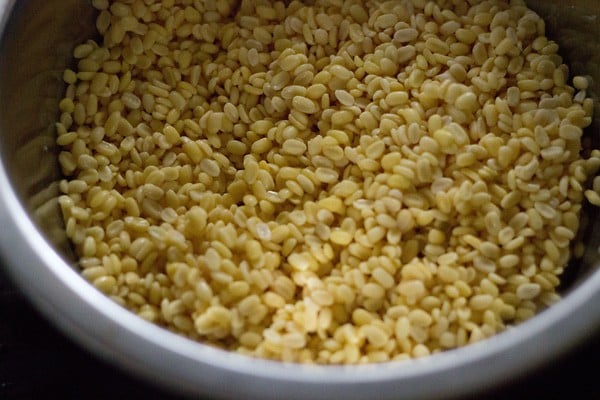
2. Drain and grind the moong dal to a smooth paste with very little water. Make a thick batter like consistency and do not make it runny or watery.
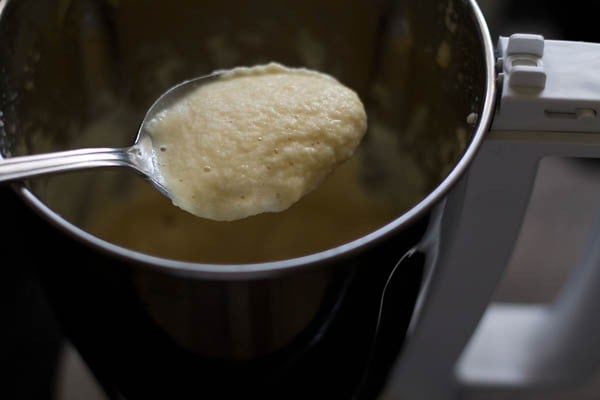
Make Moong Dal Halwa
3. Melt 9 to 10 tablespoons ghee (clarified butter) in a well-seasoned wok or kadai or a non-stick kadai or frying pan.
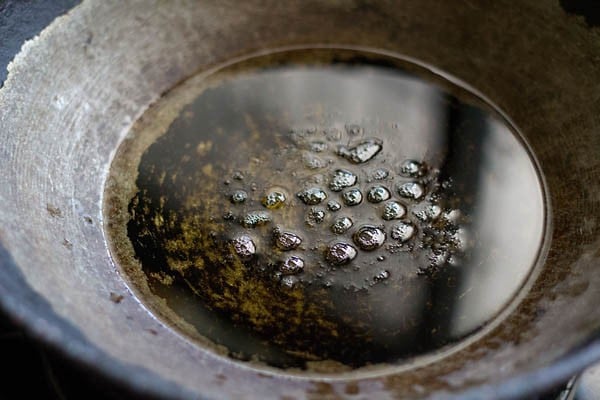
4. Add the ground moong dal paste.
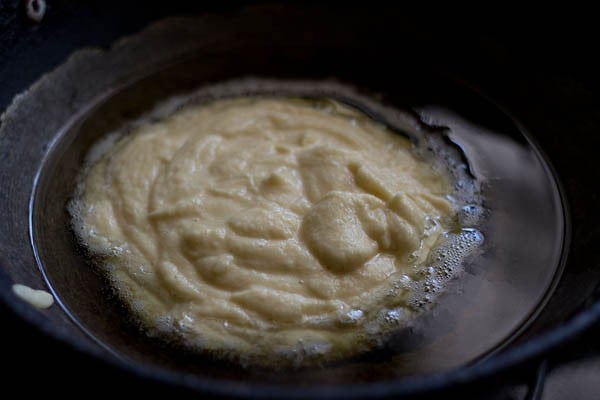
5. Stir to mix well. When stirring and mixing the mixture in the kadai, it started sticking so much to the iron kadai. So, I shifted the mixture to a non-stick kadai. It was very easy to stir the halwa then.
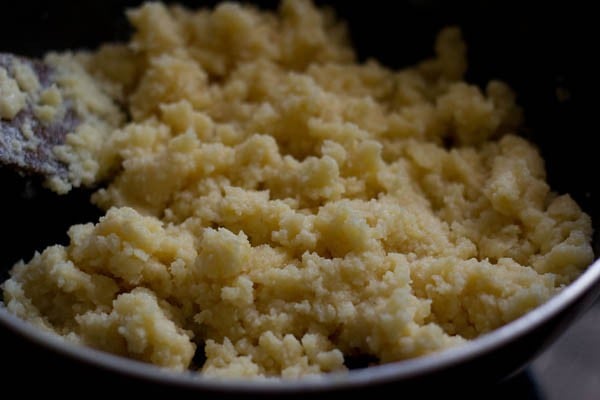
6. Keep stirring the moong dal mixture on medium-low to medium heat. The raw aroma of the moong lentils should go away completely before you go on to the next step. So, till then you have to stir and cook it.
First the mixture is pasty. Next, it becomes lumpy. Then, it breaks down and separates with the fat releasing from the sides and looks granular.
In the picture below, the mixture is at a stage where it resembles a sooji halwa, but still with the raw aroma of the moong lentils.
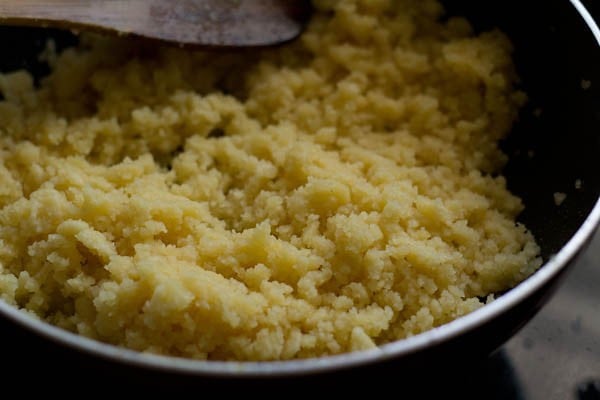
7. While the mixture is cooking, in another pan or kadai, take 1 cup full fat whole milk, 2 cups water and 1 or 1.25 cups sugar.
Keep this pan on the stovetop and stir so that the sugar dissolves. Heat this mixture till it comes to a boil.
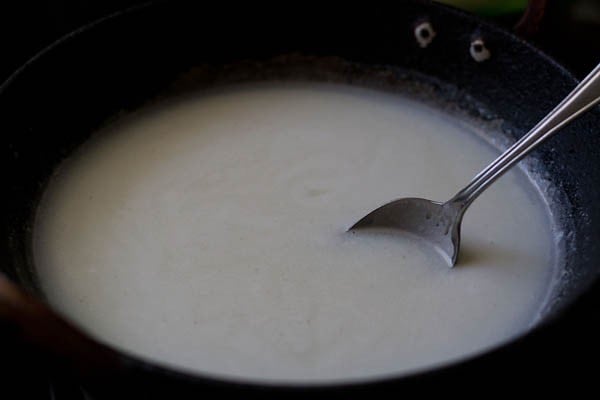
8. The moong dal mixture should separate and look golden as shown in the picture below. It will have a granular consistency. The aroma and color will change. The fat will separate.
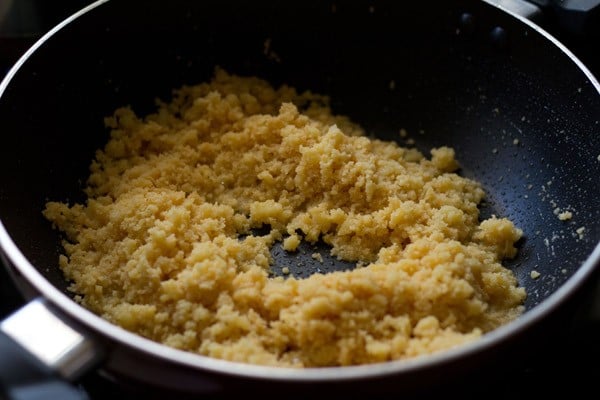
9. This is the boiling milk mixture. This is added to the well roasted moong lentils mixture.
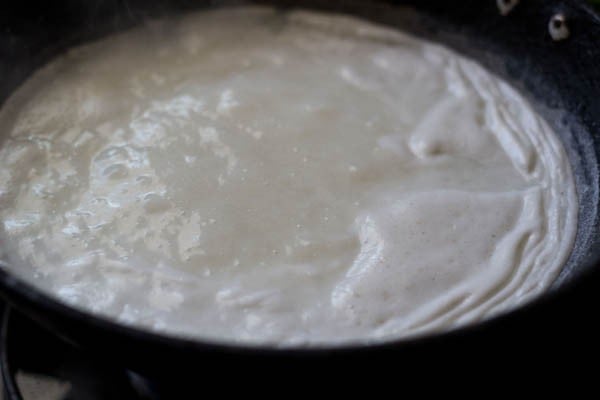
10. Pour the boiling milk mixture to the roasted moong lentils. The mixture bubbles and sizzles, so be careful while adding the hot milk mixture.
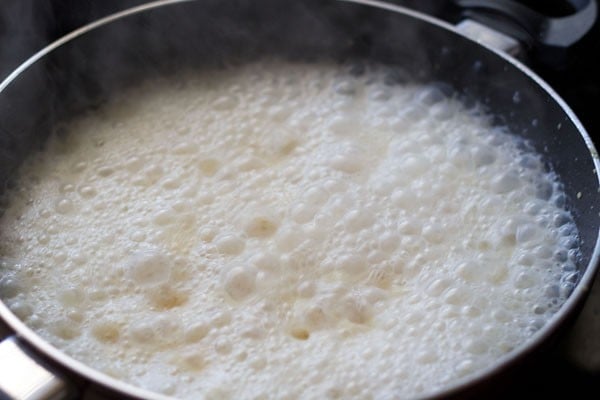
11. Stir and mix very well.
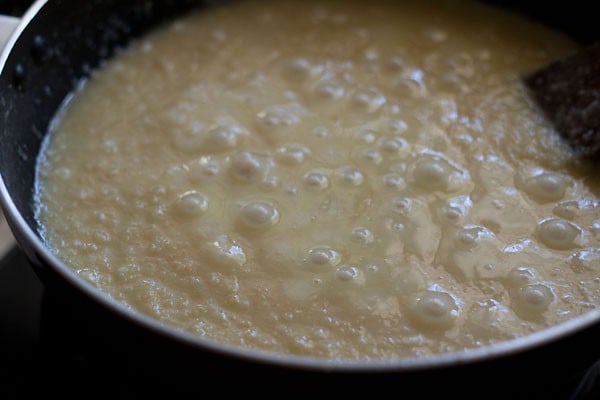
12. Simmer and cook, stirring often.
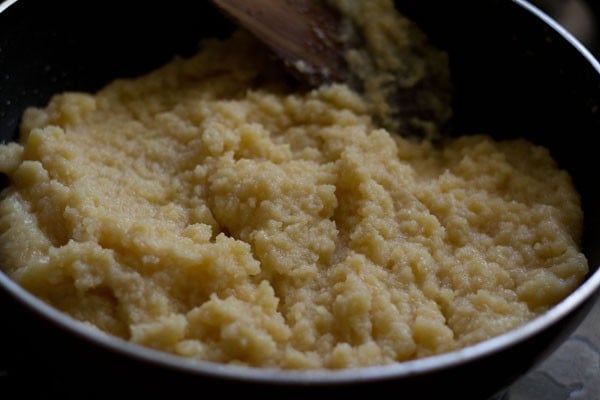
13. The liquid should get absorbed and once again you will see the ghee getting separated. This means the halwa is finally done.
Add ¼ to ⅓ teaspoon green cardamom powder, 10 to 12 chopped unsalted pistachios and 1 tablespoon golden raisins and mix before serving. It took me a total of about 1 hour to make this halwa on the stovetop.
You can add your choice of nuts or dry fruits. Some options are cashews, almonds or pine nuts.
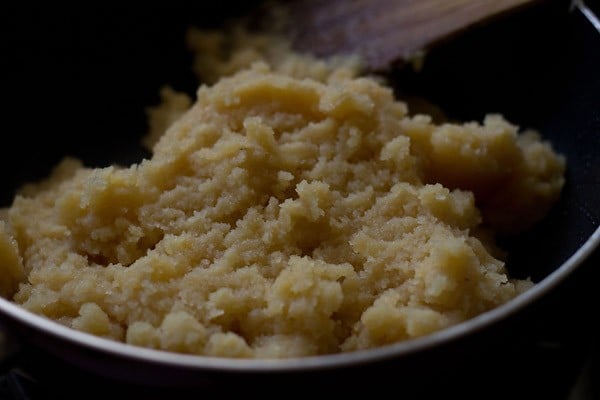
14. Serve Moong Dal Halwa hot.
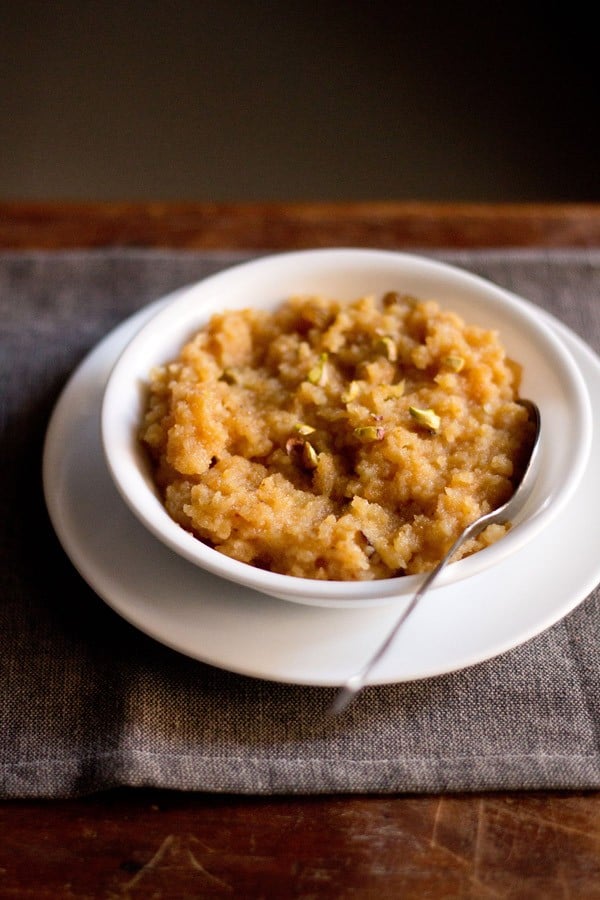
High On Halwa
The term ‘halwa’ comes from ‘hulw,’ an Arabic word meaning ‘sweet.’ Thus, it is believed that halwa originated in Arabia/Middle East and reached India through Persia. Traditionally, a Middle Eastern halwa recipe would have only date paste and milk.
However, there’s a plethora of Indian halwa variants in the modern times that are made using different ingredients. These are eventually cooked in milk/milk solids (khoya), ghee and sugar.
Whether made with fruits, vegetables, vermicelli, lentils or grains, the mouth-watering Indian halwa is absolutely a must for all dessert lovers.
Halwa is a scrumptious dessert reserved for celebratory occasions too. Though simple to make, it takes some time to cook.
Some very popular halwa varieties in the Indian subcontinent are this Moong Dal Halwa, Gajar Ka Halwa and Suji Ka Halwa. Unique ones from the list include Karachi Halwa, Besan Halwa, Apple Halwa, Kashi Halwa and more.
Expert Tips
- Soaking Lentils: Remember that soaking of the moong lentils well is important as it helps to soften the dal, which can then be ground easily to a smooth paste.
- Pans to be used: Make sure to keep on stirring the moong dal mixture to cook evenly and to prevent it from sticking to the pan. Best is to use a non-stick pan/kadai or a well seasoned kadai or frying pan for this.
- Sweetness: I have added 1 cup sugar in this recipe. For more sweetness, add 1 or 2 tablespoons more or add ¼ cup extra sugar.
- Milk: It is best to use full fat whole milk and ghee for this halwa. Brings the classic rich taste. I have mixed milk with water, but you can only use milk or only water.
- Adding Khoya: The addition of khoya or mawa (milk solids) gives a more richer flavor and taste to an already rich halwa. Crumble finely and add 1 cup khoya, when the moong dal is cooked golden, looks granular and the ghee has separated. Mix well and add sugar. Continue to stir and cook till you see the moong mixture thickening, reducing and ghee releasing from the sides. Do not add milk if you use khoya.
- Scaling: You can halve or double this Moong Dal Halwa recipe easily. Do note that doubling the recipe will involve more stirrings and more hand work.
More Halwa Recipes To Try!
Halwa Recipe
Sweets Recipes
Halwa Recipe
Please be sure to rate the recipe in the recipe card or leave a comment below if you have made it. For more vegetarian inspirations, Sign Up for my emails or follow me on Instagram, Youtube, Facebook, Pinterest or Twitter.
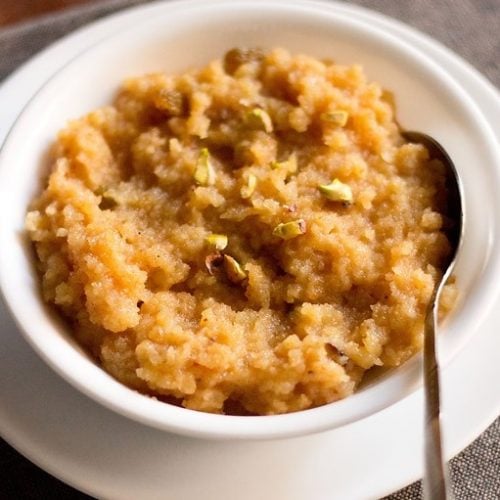
Moong Dal Halwa
Ingredients
Main ingredients
- 1 cup moong dal (spilt husked yellow mung lentils)
- 9 to 10 tablespoon Ghee (clarified butter)
- 4 green cardamoms – husked and powdered in a mortar-pestle or ¼ to ⅓ teaspoon cardamom powder
- 10 to 12 pistachios (unsalted), sliced or chopped or 10 to 12 blanched almonds – sliced
- 1 tablespoon golden raisins
To be mixed together
- 1 cup whole milk
- 2 cups water
- 1 or 1.25 cups sugar or raw sugar * check notes
Instructions
Making moong dal paste
- Soak the moong dal or mung lentils, in enough water overnight or for 4 to 5 hours.
- Drain and then grind the moong dal to a smooth paste with ¼ or ⅓ cup water to a smooth and fine consistency.
Making moong dal halwa
- Melt ghee in a nonstick kadai or frying pan or a well-seasoned wok or frying pan. Add the ground moong dal. Stir and mix well.
- Keep on stirring the halwa on a medium-low to medium heat. The halwa has the raw aroma of the moong lentils and it should go away completely before you start with the next step. So till then you have to stir and cook the halwa.
- The halwa first is pasty, then starts getting lumpy and then starts breaking down and getting separated with the fat releasing from the sides. Break the lumps while stirring.
- Meanwhile when the halwa is cooking, in another pan or kadai, take milk, water and sugar.
- Keep this pan on the stove top and stir so that the sugar dissolves. On a low or medium flame, heat this milk-water-sugar mixture till it comes to a boil.
- The moong dal mixture should reach a granular consistency before you add the hot milk mixture. You should get a fried aroma from the mung lentils and the color should become golden. The fat also should get separated.
- When the milk mixture comes to a boil, add it to the fried mung lentils.
- The mixture sizzles, so be careful while adding the hot milk and water mixture.
- Stir well. Simmer and cook stirring often.
- The liquids should get absorbed and once again you will see the ghee getting separated.
- Lastly add cardamom powder, chopped pistachios and raisins.
- Serve Moong Dal Halwa hot. You can also garnish with some pistachios and serve.
Notes
- * 1 cup sugar is just sweet which we prefer. For more sweetness you can add 1 or 2 tablespoons more of sugar or add ¼ cup sugar extra.
- Make sure to soak the lentils for a few hours so that you can grind them easily to a smooth paste.
- Remember not to add too much water while grinding and make the paste or batter runny or watery.
- The recipe can be halved or doubled.
Nutrition Info (Approximate Values)
This Moong Dal Halwa recipe post from the archives, first published on March 2014 has been republished and updated on November 2022.
